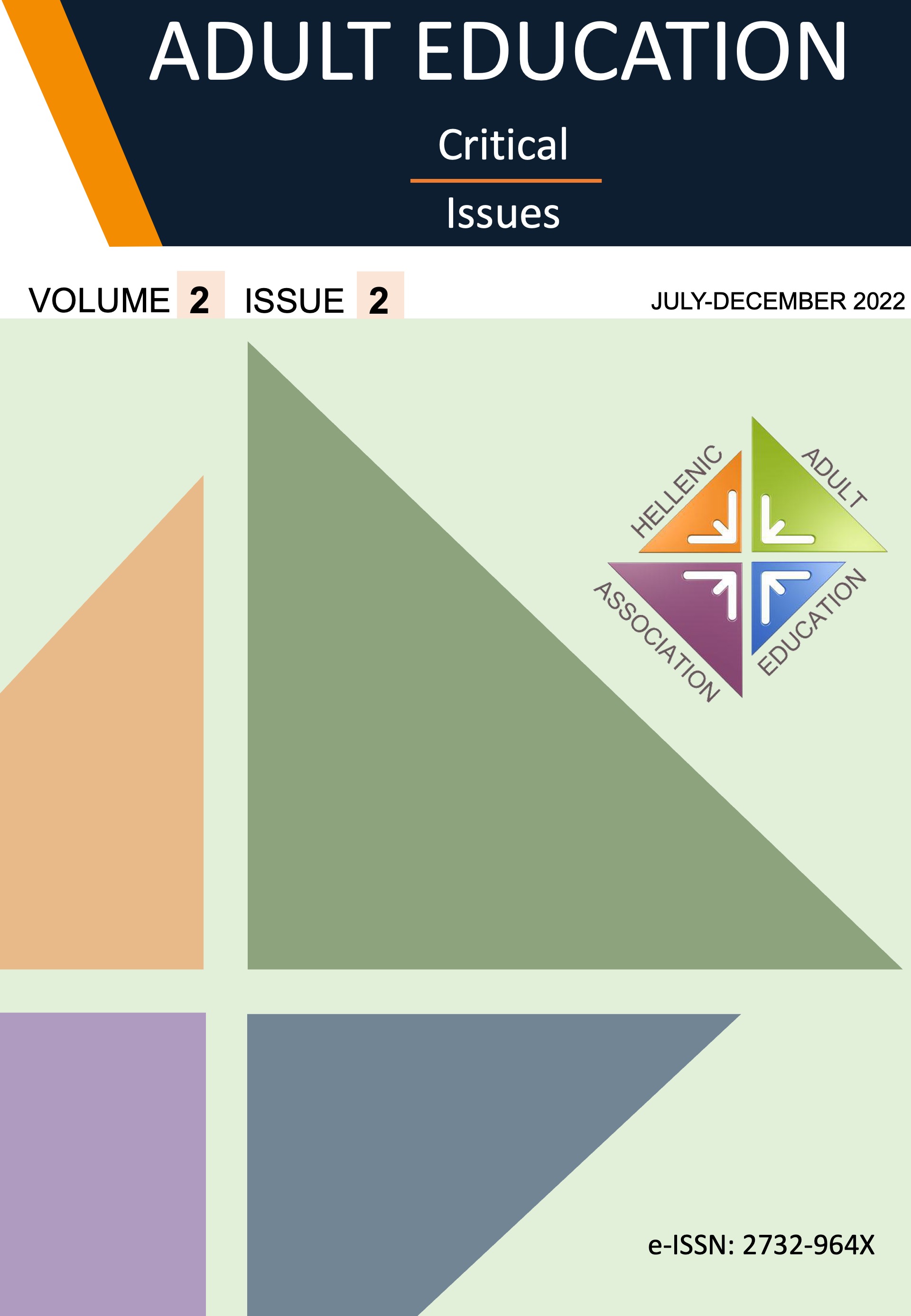Aristotle & meaningful art
Аннотация
Τhis article approaches the philosophical work of Aristotle, because it is the basis of all later philosophy. The universality that distinguishes Aristotelian thought and the fundamental truths contained in it make his philosophical view great, universal and timeless with deep insight. In this context, this study focuses mainly on Aristotle's work, Poetics, which mostly refers to tragedy, and derives some elements regarding the ethical dimension and happiness from his work Nicomachean Ethics.
Article Details
- Как цитировать
-
Papadopoulou, M. (2022). Aristotle & meaningful art. Adult Education Critical Issues, 2(2), 34–46. https://doi.org/10.12681/haea.31490
- Раздел
- Articles

Это произведение доступно по лицензии Creative Commons «Attribution» («Атрибуция») 4.0 Всемирная.
Authors who publish with this journal agree to the following terms:
- Authors retain copyright and grant the journal right of first publication with the work simultaneously licensed under a Creative Commons Attribution License that allows others to share the work with an acknowledgement of the work's authorship and initial publication in this journal.
- Authors are able to enter into separate, additional contractual arrangements for the non-exclusive distribution of the journal's published version of the work (e.g., post it to an institutional repository or publish it in a book), with an acknowledgement of its initial publication in this journal.
- Authors are permitted and encouraged to post their work online (e.g., in institutional repositories or on their website) prior to and during the submission process, as it can lead to productive exchanges, as well as earlier and greater citation of published work (See The Effect of Open Access).
Скачивания
Данные скачивания пока недоступны.
Библиографические ссылки
References
Babiniotis, G. (2002). Dictionary of the Modern Greek Language (2nd ed.). Athens: Center for Lexicology Ltd [in Greek]
Belfiore, E. (1992). Aristotle on plot and emotion. New Jersey: Princeton University Press.
Butcher, S. H. (1922). The Poetics of Aristotle (4th ed.). London: MacMillan.
Butcher, S. H. (1932). Aristotle’s Theory of Poetry and Fine Art. London: MacMillan.
Cooper, L. (1923). The Poetics of Aristotle: its Meaning and Influence. Massachusetts: The Plimpton Press.
Halliwell, S. (1992). Pleasure, Understanding, and Emotion on Aristotle’s Poetics. In Rorty, A (Ed.), Essays on Aristotle’s Poetics, (pp. 241-260). Oxford, U.K.: Princeton University Press.
House, H. (1964). Aristotle’s Poetics. London: Pupert Hart-Davis.
Kalfas, B. (2015). Aristotle's philosophy. Athens: S.E.A.B. [in Greek]
Kokkos, A. (2021). Exploring Art for Perspective Transformation. Boston: Brill-Sense.
Kontos, P. (2018). The two goods of good fortune. Introduction to Aristotle's Nicomachean Ethics. Crete: University Press. [in Greek]
Kosman, A. (1992). Acting: Drama as a Mimesis of Praxis. In Rorty, A. (Ed.), Essays on Aristotle’s Poetics, (pp. 51-72). Oxford, U.K.: Princeton University Press.
Lypourlis, D. (2006). Aristotle, "Nicomachean Ethics". Thessaloniki: Zitros. [in Greek]
Lypourlis, D. (2008). Aristotle, "Poetics". Thessaloniki: Zitros. [in Greek]
Magina, S. (1979). Complete works of Aristotle. Athens: Ofelimo biblio. [in Greek]
Mandilaras, B. (Ed.). (1992/1995). Aristotle. About Poetics (34). Apanda series. Athens: Cactus. (Volume 34). [in Greek]
Mezirow, J. (2000/2007). Learning to think like an adult. Core concepts of transformation theory. In: J. Mezirow & Associates. Transformative Learning (pp. 43-71). Athens: Metaichmio. [in Greek]
Nussbaum, Μ. C. (2001). The Fragility of Goodness: Luck and Ethics in Greek Tragedy and Philosophy. U.K: Cambridge University Press.
Nylander, E. & Fejes, A. (2016). Exploring the Adult Learning Research Field by Analysing Who Cites Whom. Vocations and Learning. Sweden: CrossMark.
Rorty, A. O. (1992). The Psychology of Aristotelian Tragedy. In Rorty, A. (Ed.), Essays on Aristotle’s Poetics, (pp. 1-22). Oxford, U.K.: Princeton University Press.
Ross, W. D. (1995). Aristotle. London and New York: Routledge.
Sherman, N. (1992). Hamartia and Virtue. In Rorty, A. (Ed.), Essays on Aristotle’s Poetics, (pp. 177-196). Oxford, U.K.: Princeton University Press.
Skaltsas, Th. (1993). The golden age of excellence: Aristotelian ethics. Athens: Alexandria. [in Greek]
Sykoutris, I. (1991). Aristotle "On Poetics". Athens: Academy of Greece/ Estia’ Bookshop.
White, S. A. (1992). Aristotle’s Favorite Tragedies. In Rorty, A. (Ed.), Essays on Aristotle’s Poetics, (pp. 221-240). Oxford, U.K.: Princeton University Press.
Online References
Georgousopoulos, K. (2018, July 5). About myths. The news. Retrieved from https://www.tanea.gr.



